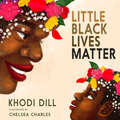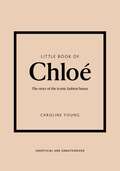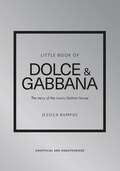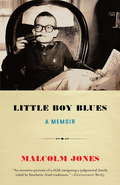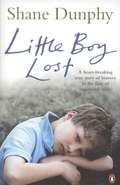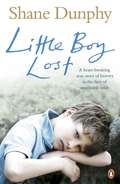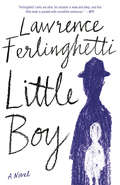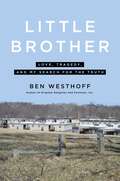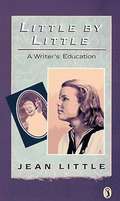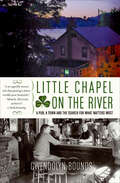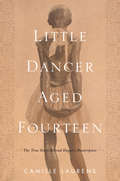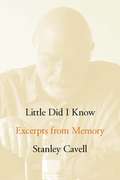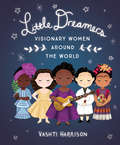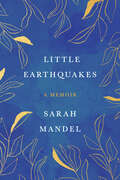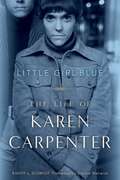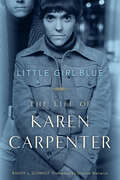- Table View
- List View
Little Black Lives Matter
by Khodi DillAn inspiring, life-affirming debut activist board book in rhyming couplets and triplets about Black heroes for little ones, their families, and anyone who loves A is for Activist and Antiracist Baby.Little Black Lives Matter empowers all children, but Black children especially, by affirming that their lives, however little they may yet be, matter. Featuring fifteen great Black heroes of the past and the powerful words they spoke and actions they took, Little Black Lives Matter is a rhyming board book that incorporates memorable quotations and a reminder to little ones that each of these great people once lived a little Black life themselves. From Harriet Tubman and Malcolm X to other inspiring freedom fighters like Marsha P. Johnson, Fred Hampton, and Frederick Douglass, writers James Baldwin, Audre Lorde, and Maya Angelou, musical artists Billie Holiday and Sister Rosetta Tharpe, athletes Wilma Rudolph, Jesse Owens, and Muhammad Ali, and Rosa Parks and Martin Luther King, Jr., this little book encourages young readers to find their inner heroes and see their own self-worth and agency through the acts of great Black heroes who came before them. &“let us look upon them and let us say their names,And let us hear the mighty words they spoke to bring us change.…Audre Lorde lived a little Black life before she wrote to inspire—&“I am deliberate and afraid of nothing&”—to remind us of our inner power, and to share her poetic fire.…&“So many who&’ve lived these little black lives have mattered, so, you see,But you needn&’t change the world, my child, to mean the world to me.
Little Book of Chanel (Little Books of Fashion)
by Emma Baxter-Wright WelbeckLittle Book of Chanel is the pocket-sized and beautifully illustrated story of the most celebrated fashion designer in history. Chronicling the life and legacy of Coco Chanel, one of fashion's most influential couturiers, this gorgeous book offers a fascinating account of Chanel's evolution and innovation. From her early days of millinery, through her revolutionary inventions in sportswear and jersey fashions for women, to the classics that made her name, such as the Chanel cardigan jacket, little black dress and exquisite perfumes. Detailed photographs and sketches of Chanel's designs, along with fashion photography and catwalk shots, pay tribute to one of the world's most highly regarded fashion houses and the woman behind it, making a striking gift for any lover of fashion.
Little Book of Chanel (Little Books of Fashion)
by Emma Baxter-Wright WelbeckLittle Book of Chanel is the pocket-sized and beautifully illustrated story of the most celebrated fashion designer in history. Chronicling the life and legacy of Coco Chanel, one of fashion's most influential couturiers, this gorgeous book offers a fascinating account of Chanel's evolution and innovation. From her early days of millinery, through her revolutionary inventions in sportswear and jersey fashions for women, to the classics that made her name, such as the Chanel cardigan jacket, little black dress and exquisite perfumes. Detailed photographs and sketches of Chanel's designs, along with fashion photography and catwalk shots, pay tribute to one of the world's most highly regarded fashion houses and the woman behind it, making a striking gift for any lover of fashion.
Little Book of Chloé: The story of the iconic brand (Little Books of Fashion)
by Caroline YoungRomantic, cool and glamorous, the Chloé woman embodies the bohemian femininity that the fashion house has become known for.From the carefree romanticism of their relaxed silhouettes to their cult status leather goods, Chloé has appealed to the modern woman since its inception in 1952. Founded by Gaby Aghion, who introduced the revolutionary concept of ready-to-wear, the maison has since been steered by legendary designers including Karl Lagerfeld, Phoebe Philo and Stella McCartney.Including carefully curated images of Chloé's most sought-after pieces as well as captivating text, Little Book of Chloé tells the story behind an iconic fashion house from its beginnings in Paris through to its continued status as the It-girl design house today.
Little Book of Chloé: The story of the iconic brand (Little Books of Fashion)
by Caroline YoungRomantic, cool and glamorous, the Chloé woman embodies the bohemian femininity that the fashion house has become known for.From the carefree romanticism of their relaxed silhouettes to their cult status leather goods, Chloé has appealed to the modern woman since its inception in 1952. Founded by Gaby Aghion, who introduced the revolutionary concept of ready-to-wear, the maison has since been steered by legendary designers including Karl Lagerfeld, Phoebe Philo and Stella McCartney.Including carefully curated images of Chloé's most sought-after pieces as well as captivating text, Little Book of Chloé tells the story behind an iconic fashion house from its beginnings in Paris through to its continued status as the It-girl design house today.
Little Book of Dolce & Gabbana: The story of the iconic fashion house (Little Books of Fashion)
by Jessica BumpusElaborate, luxurious and powerful, the Dolce & Gabbana look has always exuded decadent sensuality.With tailoring and corsets, baroque prints and innovative silhouettes, the fashion house's Italian roots sing through their distinctive ensembles in lace, leopard print and florals. Founded by designer duo Domenico Dolce and Stefano Gabbana in 1985, the brand's opulent pieces have been worn by everyone from Naomi Campbell to Jennifer Lopez.Through photographs of over 100 stunning looks alongside captivating expert text, Little Book of Dolce & Gabbanatells the story of one of the most glamorous fashion houses in the world.
Little Book of Dolce & Gabbana: The story of the iconic fashion house (Little Books of Fashion)
by Jessica BumpusElaborate, luxurious and powerful, the Dolce & Gabbana look has always exuded decadent sensuality.With tailoring and corsets, baroque prints and innovative silhouettes, the fashion house's Italian roots sing through their distinctive ensembles in lace, leopard print and florals. Founded by designer duo Domenico Dolce and Stefano Gabbana in 1985, the brand's opulent pieces have been worn by everyone from Naomi Campbell to Jennifer Lopez.Through photographs of over 100 stunning looks alongside captivating expert text, Little Book of Dolce & Gabbanatells the story of one of the most glamorous fashion houses in the world.
Little Boy Blues
by Malcolm JonesFrom one of our most astute cultural observers, a piercing memoir about a family’s breakup and the need simultaneously to embrace and distance ourselves from the people and events that shape us. North Carolina in the 1950s and 1960s: A child surrounded mostly by grandparents, aunts, and uncles born in the previous century, Malcolm Jones finds himself underfoot in a disintegrating marriage. His father is charming but careless about steady work, often gone from home and often drunk. His mother, a schoolteacher and faded Southern belle, clings to the past while hungering for respectability and stability. Jones vividly describes their faltering marriage as it plays out against larger cracks in society: the convulsions of desegregation and a popular culture that threatens the church-centered life of his family. He also recalls idyllic times and the ordinary, easy moments of an otherwise fraught childhood: discovering an old Victrola, attending a marionette show-experiences that offer a portal to other worlds. Richly evoking a time and place with rare depth of feeling and a penetrating, often bittersweet candor, Malcolm Jones gives us the fundamental stories of a life-where he comes from, who he was, who he has become.
Little Boy Lost
by Shane DunphyLittle Boy Lost is the story of Dominic's brave battle to face up to betrayal and show - one more time - that he is a survivor.
Little Boy Lost
by Shane DunphyCourage is sometimes found in the unlikeliest places ...Dominic is a sixteen year-old man-child: while he has the body of a prize-fighter, as a result of a terrible seizure when he was a small child he has been left with the mind of a child. In the centre where he spends his days, Dominic is a challenge and an inspiration: someone who struggles against the odds and whose every victory over his limitations is a cause for celebration. But when a new member of staff at the centre breaks a sacred trust, the fall-out is horrific and Dominic becomes a pawn in a dangerous game. Little Boy Lost is the story of Dominic's brave battle to face up to betrayal and show - one more time - that he is a survivor.
Little Boy: A Novel
by Lawrence FerlinghettiFrom the famed publisher and poet, author of the million-copy-selling collection A Coney Island of the Mind, his literary last will and testament -- part autobiography, part summing up, part Beat-inflected torrent of language and feeling, and all magical. <P><P>In this unapologetically unclassifiable work Lawrence Ferlinghetti lets loose an exhilarating rush of language to craft what might be termed a closing statement about his highly significant and productive 99 years on this planet. <P><P>The "Little Boy" of the title is Ferlinghetti himself as a child, shuffled from his overburdened mother to his French aunt to foster childhood with a rich Bronxville family. Service in World War Two (including the D-Day landing), graduate work, and a scholar gypsy's vagabond life in Paris followed. <P><P> These biographical reminiscences are interweaved with Allen Ginsberg-esque high energy bursts of raw emotion, rumination, reflection, reminiscence and prognostication on what we may face as a species on Planet Earth in the future. <P><P>Little Boy is a magical font of literary lore with allusions galore, a final repository of hard-earned and durable wisdom, a compositional high wire act without a net (or all that much punctuation) and just a gas and an inspiration to read.
Little Brother: Love, Tragedy, and My Search for the Truth
by Ben WesthoffThis intimate exploration of race and inequality in America tells the story of a journalist&’s long-time relationship with his mentee, Jorell Cleveland, through the Big Brothers Big Sisters program and investigates Jorell's tragic fatal shooting. In 2005, soon after Ben Westhoff moved to St. Louis, he joined the Big Brothers Big Sisters program and was paired with Jorell Cleveland. Ben was twenty-eight, a white college grad from an affluent family. Jorell was eight, one of nine children from a poor, African American family living in nearby Ferguson. But the two instantly connected. Ben and Jorell formed a bond stronger than nearly any other in their lives. When Ben met the woman who'd become his wife, she observed that Ben and Jorell were "a package deal." They were brothers.In the summer of 2016, Jorell was shot at point blank range in broad daylight in the middle of the street, yet no one was charged in his death. Ben grappled with mourning Jorell, but also with a feeling of responsibility. As Jorell&’s mentor, what could he have done differently? As a journalist, he had reported on gang life, interviewed crime kingpins, and even infiltrated drug labs in China. But now, he was investigating the life and death of someone he knew personally and examining what he did and did not know about his friend. Learning the truth about Jorell and the man who killed him required Ben to uncover a heartbreaking cycle of poverty, poor education, drug trafficking, and violence. Little Brother brilliantly combines a deeply personal history with a true-crime narrative that exposes the realities of life in communities like Ferguson all around the country.
Little By Little: A Writer's Education
by Jean LittleJean Little, award winning Canadian author, writes her first book of memoirs. Written with vivid recall of emotions and events, Little's autobiography begins with her early childhood in Taiwan, covers her growing up legally blind, dealing with public school and social problems, and ends with the publication of her first book, Mine for Keeps. Jean Little's work has mainly consisted of children's literature, but she has also written two autobiographies: Little by Little and Stars Come Out Within. Little has been partially blind since birth as a result of scars on her cornea and is frequently accompanied by a guide dog.
Little Chapel on the River: A Pub, a Town and the Search for What Matters Most
by Gwendolyn BoundsForced from her downtown Manhattan apartment by the terrorist attack of September 11, journalist Wendy Bounds was delivered to Guinan's doorstep -- a legendary Irish drinking hole and country store nestled along the banks of the Hudson River in the small town of Garrison, New York -- by a friend.Captivated by the bar's charismatic but ailing owner and his charming, motley clientele, Bounds uprooted herself permanently and moved to tiny Garrison, the picturesque river town they all call home. There she became one of the rare female regulars at the old pub and was quickly swept up into its rhythm, heartbeat, and grand history -- as related by Jim Guinan himself, the stubborn high priest of this little chapel. Surrounded by a crew of endearing, delightfully colorful characters who were now her neighbors and friends, she slowly finds her own way home.Beautifully written, deeply personal, and brilliantly insightful, Little Chapel on the River is a love story about a place -- and the people who bring it to life.
Little Dancer Aged Fourteen: The True Story Behind Degas's Masterpiece
by Camille LaurensThis absorbing, heartfelt work uncovers the story of the real dancer behind Degas’s now-iconic sculpture, shedding light on the struggles of late nineteenth-century Parisian life. She is famous throughout the world, but how many know her name? You can admire her figure in Washington, Paris, London, New York, Dresden, or Copenhagen, but where is her grave? We know only her age, fourteen, and the work that she did—because it was already grueling work, at an age when children today are sent to school. In the 1880s, she danced as a “little rat” at the Paris Opera, and what is often a dream for young girls now wasn’t a dream for her. She was fired after several years of intense labor; the director had had enough of her repeated absences. She had been working another job, even two, because the few pennies the Opera paid weren’t enough to keep her and her family fed. She was a model, posing for painters or sculptors—among them Edgar Degas. Drawing on a wealth of historical material as well as her own love of ballet and personal experiences of loss, Camille Laurens presents a compelling, compassionate portrait of Marie van Goethem and the world she inhabited that shows the importance of those who have traditionally been overlooked in the study of art.
Little Daughter
by Damien Lewis Zoya PhanZoya Phan was born in the remote jungles of Burma, to the Karen ethnic group. For decades the Karen have been under attack from Burma's military junta; Zoya's mother was a guerrilla soldier, her father a freedom activist. She lived in a bamboo hut on stilts by the Moei River; she hunted for edible fungi with her much-loved adopted brother, Say Say. Many Karen are Christian or Buddhist, but Zoya's parents were animist, venerating the spirits of forest, river and moon. Her early years were blissfully removed from the war. At the age of fourteen, however, Zoya's childhood was shattered as the Burmese army attacked. With their house in flames, Zoya and her family fled. So began two terrible years of running from guns, as Zoya joined thousands of refugees hiding in the jungle. Her family scattered, Zoya sought sanctuary across the border in a Thai refugee camp. Conditions in the camp were difficult, and Zoya now had to care for her ailing mother. Zoya, a gifted pupil, was eventually able to escape, first to Bangkok and then, with her enemies still pursuing her, in 2004 she fled to the UK and claimed asylum. The following year, at a 'free Burma' march, she was plucked from the crowd to appear on the BBC, the first of countless interviews with the world's media. She became the face of a nation enslaved, rubbing shoulders with presidents and film stars. By turns uplifting, tragic and entirely gripping, this is the extraordinary true story of the girl from the jungle who became an icon of a suffering land.
Little Did I Know
by Stanley CavellAn autobiography in the form of a philosophical diary, Little Did I Know's underlying motive is to describe the events of a life that produced the kind of writing associated with Stanley Cavell's name. Cavell recounts his journey from early childhood in Atlanta, Georgia, through musical studies at UC Berkeley and Julliard, his subsequent veering off into philosophy at UCLA, his Ph.D. studies at Harvard, and his half century of teaching. Influential people from various fields figure prominently or in passing over the course of this memoir. J.L. Austin, Ernest Bloch, Roger Sessions, Thomas Kuhn, Robert Lowell, Rogers Albritton, Seymour Shifrin, John Rawls, Bernard Williams, W. V. O. Quine, and Jacques Derrida are no longer with us; but Cavell also pays homage to the living: Michael Fried, John Harbison, Rose Mary Harbison, Kurt Fischer, Milton Babbitt, Thompson Clarke, John Hollander, Hilary Putnam, Sandra Laugier, Belle Randall, and Terrence Malick. The drift of his narrative also registers the decisiveness of the relatively unknown and the purely accidental. Cavell's life has produced a trail of some eighteen published books that range from treatments of individual writers like Wittgenstein, Austin, Emerson, Thoreau, Heidegger, Shakespeare, and Beckett to studies in aesthetics, epistemology, moral and political philosophy, cinema, opera, and religion.
Little Dreamers: Visionary Women Around the World (Vashti Harrison)
by Vashti HarrisonFrom the New York Times bestselling author of Little Leaders: Bold Women in Black History comes the highly anticipated follow-up, a beautifully illustrated collectible detailing the lives of women creators around the world.Featuring the true stories of 40 women creators, ranging from writers to inventors, artists to scientists, Little Dreamers: Visionary Women Around the World inspires as it educates. Readers will meet trailblazing women like Mary Blair, an American modernist painter who had a major influence on how color was used in early animated films, actor/inventor Hedy Lamar, environmental activist Wangari Maathai, architect Zaha Hadid, filmmaker Maya Deren, and physicist Chien-Shiung Wu. Some names are known, some are not, but all of the women had a lasting effect on the fields they worked in.The charming, information-filled full-color spreads show the Dreamers as both accessible and aspirational so reader knows they, too, can grow up to do something amazing.
Little Earthquakes: A Memoir
by Sarah Mandel“Sarah Mandel has done something remarkable here. I found myself weeping, laughing with delight and moved with love—all in the span of the day it took me to devour this book. Filled with deliciously specific images and metaphors, clear dialogue, and rich explorations of self and others, Mandel has written—among other things—a tender witness statement of and for her body.”—Hala Alyan, author of Salt HousesA psychologist, wife, and mother chronicles her extraordinary journey with cancer while pregnant with her second baby, and the insights into life, death, trauma, and healing that she gleaned—an utterly inspiring debut memoir reminiscent of the intimacy and emotional power of Paul Kalanithi’s When Breath Becomes Air and Kate Bowler’s No Cure for Being Human.When clinical psychologist Sarah Mandel was pregnant with her second child, she began preparing for her maternity leave, juggling the demands of her soon-to-be-new baby with the needs of her patients. Noticing a lump in her breast, she assumed it was most likely a clogged milk duct. But a biopsy revealed it was not. When she went into labor, she learned that she had Stage Four cancer—devastating news that forced her to confront terminal illness as she was bringing new life into the world.But Sarah's illness took a highly improbable turn when, after three months of treatment, her second PET scan showed no evidence of disease. Sarah, however, was unable to celebrate the good news; she was frozen in a dissociated state caused by the emotional whiplash of going from oncology patient to new mother, from a terminal sentence to a shocking reprieve. As a therapist who specialized in trauma work, Sarah had utilized “narrative therapy” to help her patients. Now she wondered: Could the treatment that eased her patients’ pain successfully help her navigate her own trauma?Little Earthquakes is a beautiful and thought-provoking debut from a brave and unwavering new voice that captures the mind, sears the soul, and leaves its indelible mark on the heart.
Little Elizabeth: The Young Princess Who Became Queen
by Valerie WildingThe incredible true story of a young and brilliant Princess who grew up to become our Queen. Once, a very long time ago, there was a little Princess called Elizabeth who loved to play and have fun with her horses, dogs and little sister, Margaret. But when she was ten years old, her life changed forever.From growing up during the Second World War and training as an army mechanic, to celebrating VE day with the people of Britain and marrying Prince Phillip - the man she loved, this is the amazing true story of a little girl who became Queen Elizabeth II.With fantastically fun, charming and playful illustrations by Pauline Reeves, this picture book will amaze and entertain young readers.
Little Faithfuls: You're So Brave (Little Faithfuls)
by Carrie MarrsChildren will be inspired to be brave for God as they read this biography collection of Bible heroes who took action and did courageous things with God&’s help.Little Faithfuls is the first Christian series of &”Little&” biography collections for kids. Fans of the Little People, Big Dreams series, Who Was? series, and This Little Trailblazer and This Little Dreamer will love introducing their children to the best role models of all, straight out of Scripture.This beautiful picture book for 4 to 8-year-oldstells God&’s big story of bravery, from David fighting Goliath, Esther risking her life to save her people, and Mary believing the angel's announcement that she would be the mother of Jesusfeatures 12 godly men and women from your favorite Bible stories in the Old and New Testamentsreminds young readers what it means to be brave, why bravery is an exciting opportunity from God, and how they can be a brave part of God's story tooteaches that God helps people be brave and uses them for good in the worldempowers kids to take action and do the right thing even when it&’s scaryWith eye-catching art and age-appropriate biographical bonus facts, You're So Brave focuses on God's big story of bravery, culminating in Jesus' ultimate bravery on the cross. Children will learn that God's people were brave because they loved following God. As it points young readers back to the true source of their bravery, this inspiring picture book draws kids in to learn more about heroes of faith and to be brave right where they are.
Little Faithfuls: You're So Kind (Little Faithfuls)
by Carrie MarrsChildren will be inspired to be kind for God as they read this biography collection of Bible heroes who took action and showed kindness with God&’s help.Little Faithfuls is the first Christian series of &”Little&” biography collections for kids. Fans of the Little People, Big Dreams series, Who Was? series, and This Little Trailblazer and This Little Dreamer will love introducing their children to the best role models of all, straight out of Scripture.This beautiful picture book for 4 to 8-year-oldstells God&’s big story of kindness, from Joseph forgiving his brothers, Ruth choosing to go with Naomi to a new place, and Tabitha providing food and clothes for people in needfeatures 12 godly men and women from your favorite Bible stories in the Old and New Testamentsreminds young readers what it means to be kind, why kindness is an exciting opportunity from God, and how they can be a part of God's story by showing kindnessteaches that being kind shows others how much God loves themempowers kids to take action and do the right thing even when it&’s scaryWith eye-catching art and age-appropriate biographical bonus facts, You're So Kind focuses on God's big story of kindness, culminating in Jesus' ultimate kindness on the cross. Children will learn that God's people were kind because God first showed kindness to His people. As it points young readers back to the true source of kindness, this inspiring picture book draws kids in to learn more about heroes of faith and to be kind right where they are.
Little Girl Blue: The Life of Karen Carpenter
by Randy Schmidt Dionne WarwickLittle Girl Blue is an intimate profile of Karen Carpenter, a girl from a modest Connecticut upbringing who became a Southern California superstar. Karen was the instantly recognizable lead singer of the Carpenters. The top-selling American musical act of the 1970s, they delivered the love songs that defined a generation. Karen's velvety voice on a string of 16 consecutive Top 20 hits from 1970 to 1976, including "Close to You," "We've Only Just Begun," "Rainy Days and Mondays," "Superstar, and "Hurting Each Other," propelled the duo to worldwide stardom and record sales of more than 100 million. During their short musical career, the Carpenters released ten studio albums, toured more than 200 days a year, taped five television specials, and won three Grammys and an American Music Award. But that's only a part of Karen's story. Little Girl Blue reveals Karen's heartbreaking struggles with her mother, brother, and husband; the intimate disclosures she made to her closest friends; her love for playing drums and her frustrated quest for solo stardom; and the ups and downs of her treatment for anorexia nervosa. After her shocking death at 32 years of age in 1983, she became the proverbial poster child for that disorder; but the other causes of her decline are laid bare for the first time in this moving account. Little Girl Blue is Karen Carpenter's definitive biography, based on exclusive interviews with her innermost circle of girlfriends and nearly 100 others, including professional associates, childhood friends, and lovers. It tells a story as touching, warm, and involving as any of Karen's greatest songs.
Little Girl Blue: The Life of Karen Carpenter
by Dionne Warwick Randy L. SchmidtAn intimate profile of one of the most popular American singers of the 20th century, this first full-length biography of Karen Carpenter details every aspect of her life, from her modest Connecticut upbringing and her rise to stardom in southern California to the real story of her tragic, untimely death. This illuminating depiction of a 1970s icon covers her time as lead singer of the Carpenters--the top-selling American musical act of the decade--and provides insight into their string of 16 consecutive top-20 hits, including "Close to You," "We've Only Just Begun," "Top of the World," and "Superstar," as well as a critical review of her aborted solo career. A behind-the-scenes look into the life of a superstar, from the prolific recordings and the relentless touring to the awards, fame, and fortune, this history also chronicles her struggle with anorexia nervosa and gives important new details from her autopsy that shed new light on her death at age 32. Groups such as Sonic Youth and the Corrs and artists including k. d. lang and Madonna have cited Karen Carpenter among their major influences, and this definitive biography, based on exclusive interviews with nearly 100 of her friends and associates, is a testament to her brief yet remarkable life.
Little Girl Left Behind
by Linda Watson-Brown Sheena HarrisonFrom the age of three Sheena Harrison was brought up by her grandmother whilst her own mother, Kathleen, sought work in America. Kathleen later returned for her daughter, but her mother refused to hand her over, saying Sheena had settled into her new home. She left once more for the States, believing that Sheena would be loved, cared for and kept safe. What she did not know was that Granny Morag would go on to allow, indeed facilitate, the horrific abuse of little Sheena. From the age of four, she was appallingly abused by members of her own family, being little more than a plaything for their perverted desires. Her uncle and others saw abuse as normal, and they raped and assaulted her with impunity. As she entered her teenage years, Sheena became highly promiscuous and also needed medical attention for some of the damage inflicted upon her. In this book, Sheena tells her full story with heart-breaking honesty. It is a story of cruelty and horror, but also one which shows the remarkable resilience of the human spirit. Sheena's experiences are almost unimaginable and yet she has survived them as a reflective, caring woman who can both forgive and look ahead. It is a story which will make you angry but will also touch your heart.
